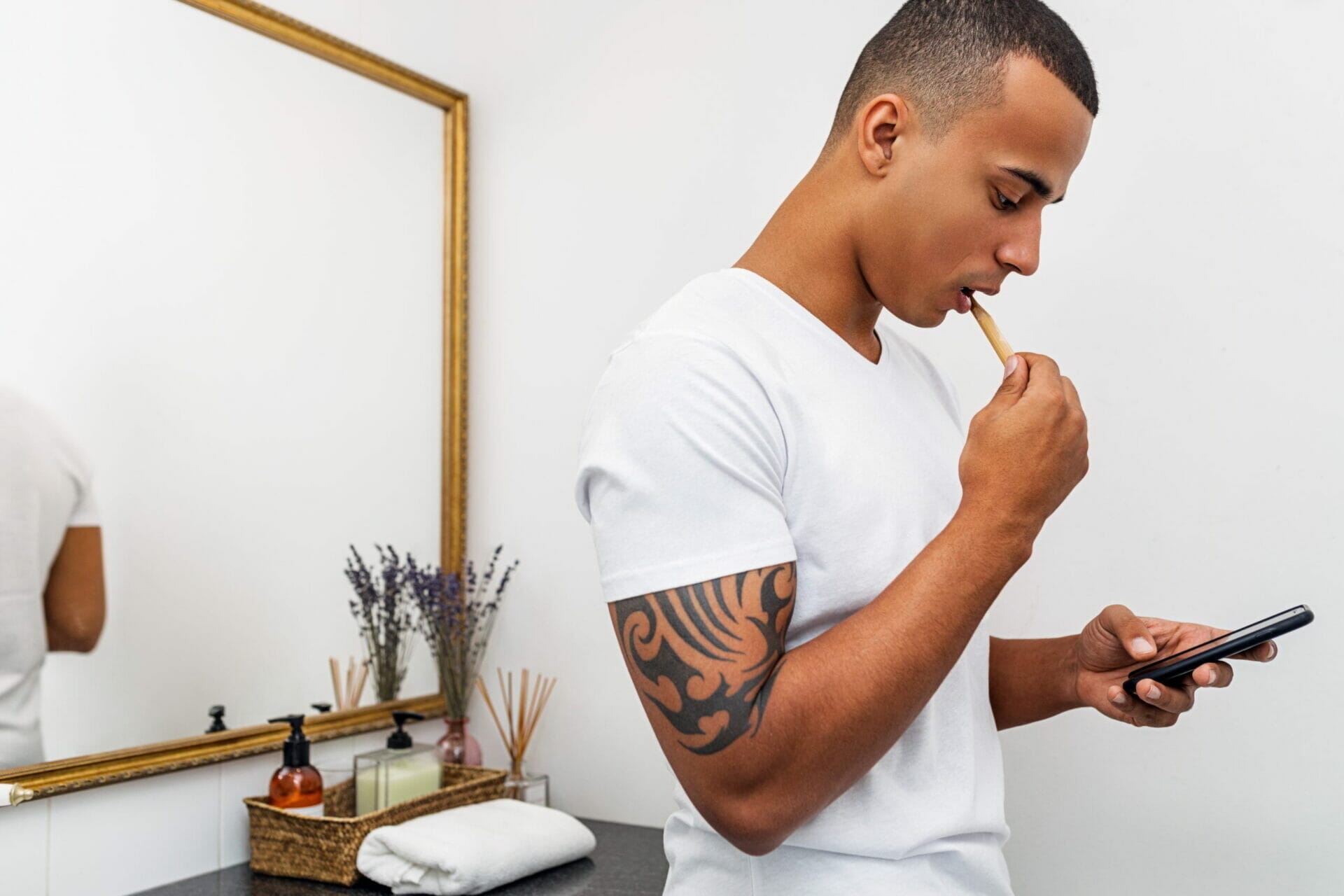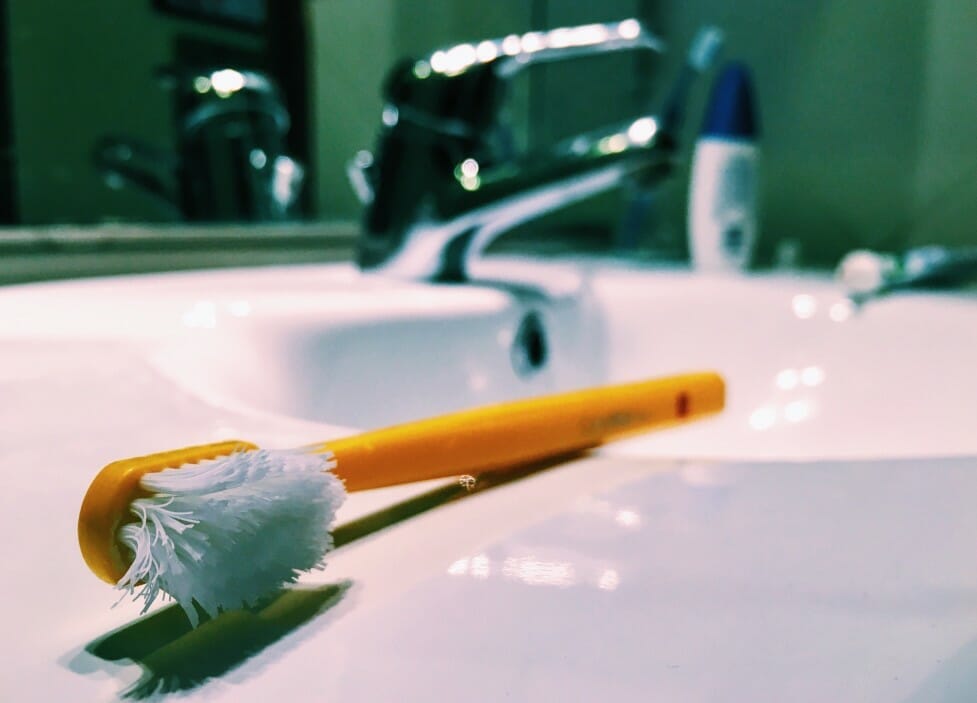
My name is Kyle Hornby and I am a Dentist in Kitchener, Ontario. Each week, I tackle subjects and answer FAQs to help raise the bar on dental health information available to the general public. Today, I'm going to discuss all things tooth brushing so you can get the most out of your dental home care routine!
Before we get into tooth brushing basics, let's talk about what you should be using. For a long time in North America, a 0.243% fluoridated toothpaste has been the gold standard for adults and children over 3 years of age. However, more and more parents are trying to avoid fluoride for their young ones. So, what are the options?
It's important to be aware that fluoride has considerable clout in the toothpaste world because it makes enamel more resistant to acid attack. If you put two pieces of enamel in acid, the one that's been treated with fluoride will dissolve at a much slower rate compared to the untreated piece. So, it's valuable but what if I want to avoid it with my kids?
Well, I don't recommend brushing with water only. I also do not recommend the use of non-fluoridated toothpastes because your teeth need some kind of supplement.
There is a product by the name of Hydroxyapatite (high-drox-ee-ah-pah-tight) Toothpaste, or HA Toothpaste, that is gaining traction within the North American toothpaste market. HA is the main building block for tooth enamel and dentin. When you brush with HA Toothpaste, you're feeding your teeth what they need to heal early cavities. This can help you to stop tooth decay before it reaches a point where it can require treatment, namely, dental fillings.
For parents who would prefer to avoid fluoride while keeping their child's teeth healthy, HA Toothpaste may provide the answer.
Generally, you should use a pea-size amount of toothpaste when brushing your teeth.
Brushing your teeth should be an active exercise for you. What I mean by this is that you shouldn't do other things (like using your cell phone) while brushing. When you brush, focus on what you're doing as it will pay dividends. Paying attention will help you to focus on your technique and, with brushing, technique is everything.
The most common mistake people make is to brush across their teeth in a sawing motion. There are at least 2 reasons why this can be problematic:
So, here's what works even better...
You want to angle your brush at 45 degrees toward the gums and then massage your teeth with a circular brushing motion. You can use fairly tight circles. Watch where your bristles go when you do this. You'll notice that they get in between teeth and also into the gum line areas.
Research has shown that, with an angled-circular technique, you can actually get about 1mm under your gums. This enables you to better clean your gum pockets. You won't get that kind of coverage with the sawing technique.
Now, you have to be more gentle on gum tissue than you do on tooth enamel. But, you still need to get your gums clean. So here's the deal for doing this properly. Make sure that you can both see and feel toothbrush bristles making contact with your gums, but try to remember that this contact should be very light.
Think painting, not scrubbing.
A light pressure technique will mean that you have to take longer to get your teeth feeling sparkly clean, but it also means you won't wear down your enamel.
Yes, to spitting out the toothpaste. If you are using a fluoride-containing toothpaste, you don't want to ingest gobs of it. Now, should you rinse? Technically, any toothpaste ingredient that strengthens your enamel can do more good the longer it's in contact with your teeth. So, if you avoid rinsing after brushing, you'll retain a small reservoir of either Fluoride or Hydroxyapatite in your saliva while you sleep.
This can have a tremendous benefit to your teeth. That old saying that sometimes a little goes a long way certainly applies here.
My only reservation with regard to not rinsing concerns standard Fluoride toothpastes. These almost always contain Sodium Lauryl Sulfate (SLS), a mild detergent that makes toothpastes feel foamy. SLS can strip the reddish-pink mucosa from your cheeks and the inner surfaces of your lips. This can contribute to forming aphthous ulcers and it will make life worse for patients who already suffer from recurrent battles with these sores.
So, as a general rule, I'd advise anybody prone to aphthous ulcers (or "canker sores") to rinse thoroughly if brushing with an SLS-containing fluoride toothpaste.
Ideally, you should brush your teeth in the morning when you wake up, at night before you sleep and 45 minutes after meals. If you can manage this (in addition to daily flossing), you will minimize or eliminate the need for corrective dental treatment.
At the same time, I realize that brushing after meals may not be possible for everybody, especially if they eat while at work. So, if you can at least brush in the morning and at night before bed, that will help you to fend off tooth decay.
NOTE: After meals, there is an acidity spike in the mouth and brushing your teeth under these conditions will erode your enamel. The spike in acidity comes back down to normal levels after about 45 minutes. This is a much safer time for brushing your teeth.
This sort of varies from person to person. Some people have larger teeth and, therefore, more surface are to cover when brushing. Some people have 28 teeth, while others may have far fewer. If somebody has orthodontic braces, they will need more time to work around those impediments.
So, the amount of time you should spend brushing really does depend on a number of factors.
Generally, I suggest to my patients that they brush for 2 minutes in the morning and 3-4 minutes before bed.
Why the discrepancy?
Well, simply put, when you wake up and brush your teeth you are doing so mostly to achieve fresh breath. You don't really have much on your teeth if you brushed thoroughly the night before. In contrast, your nighttime brush comes after a full day of eating meals and building up tenacious plaque deposits on your teeth. Plus, the stakes are much higher with your nighttime brush. If you leave any plaque on your teeth it can stagnate and cause damage to your teeth and gums through the night.
So, generally, you should spend at least 3 minutes brushing with light, circular pressure before bed. If you nail this part of your home care routine, you'll enjoy 8-10 hours of regenerative time while you sleep. Simply put, your gums can heal and your teeth can re-mineralize with the help of Calcium and Phosphorus in your saliva.
This is one of the most common questions we receive at our Kitchener Dental Office. What makes things tricky with the "once-a-day" approach is that people tend to choose the morning for brushing. The payoff on morning brushing is fresh breath which is very appealing. However, when you don't brush before bedtime, plaque, food debris and other contaminants stagnate in your mouth overnight.
I encourage every patient to brush at least twice each day. If someone insists on brushing only once, I recommend that they do so before going to sleep.

As your toothbrush ages, the bristles begin to splay out in different directions and they become rougher. The splaying prevents you from properly cleaning your teeth while the bristle roughness can damage your tooth enamel. Additionally, your brush accumulates a pathogen load over time. If you suffer from recurrent cold sores (Herpes Simplex Virus 1 causes this), you may be harbouring the main ingredient for a flare-up right on your toothbrush. These are just a few reasons for replacing your toothbrush regularly.
But, how often is often enough?
Generally, you want to replace your toothbrush every 1-2 months. Your bristles will splay out faster and to a greater degree if you normally brush with heavier force (this is not great for your gums and tooth enamel). If your brush bristles are looking haggardly after a month, change your brush then.
You can probably go up to 3 months on each brush but, generally, replacing them slightly more frequently is good practice.
Brushing your teeth is an essential part of a sound oral health program. Brushing our teeth has the potential to eliminate harmful plaque and debris but it can also damage our teeth and gums, if done improperly. Increasing your brushing time, while using lighter force and the correct circular motion will help you to strike a nice balance between disrupting harmful plaque and being kind to your teeth and gums.
Make sure to have a good quality toothbrush and replace it at reasonable intervals to keep it functioning optimally. Be strategic about tooth brushing times and make sure you know what's in your toothpaste.
If you learn the correct technique and brushing frequency early on, your teeth and gums will be happy and serve you well for a lifetime.
By Dr. Kyle Hornby, Kitchener Dentist
Our Kitchener Dental Office is conveniently located in Downtown Kitchener. We are a short drive away for families in Waterloo, Breslau & St. Jacobs. Our central location means we truly offer family dentistry near you!
This article is not intended to be a substitute for professional advice, diagnosis, or treatment. Accordingly, always seek the advice of your Dentist or other healthcare providers regarding a dental condition or treatment.
